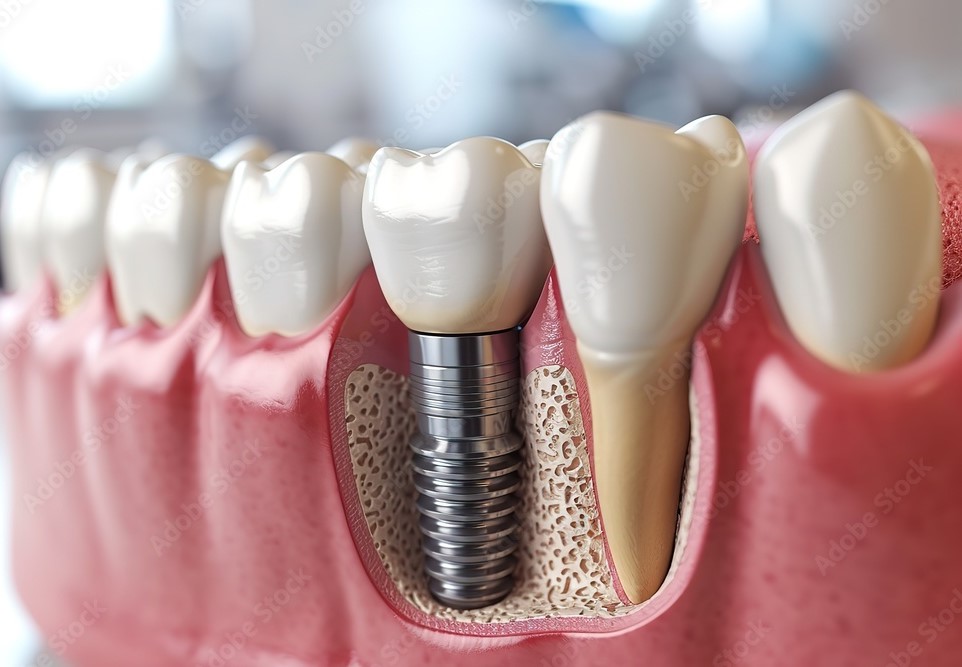IMPLANTS
Restorative Dental Care in Merrylands
Implants
Dental implants offer a vital solution for replacing missing teeth, providing stability and functionality akin to natural teeth. The implant procedure typically involves several stages: placement of the implant post into the jawbone, allowing time for osseointegration (fusion of the implant with the bone), and attachment of the abutment and crown for a natural-looking restoration. Dental implants are crucial not only for restoring chewing ability and speech clarity but also for preventing bone loss and maintaining facial structure. To make this transformative treatment accessible, we offer flexible payment options tailored to our patients’ needs, ensuring affordability without compromising on quality or care. With easy payment plans available, achieving a confident, functional smile through dental implants is within reach for all our patients.
Assessment
Initial evaluation, including X-rays and molds of the mouth, to determine the suitability for implants.
Placement
The implant is surgically placed into the jawbone under local anesthesia.
Osseointegration
The healing process, during which the implant integrates with the jawbone, usually taking several months
Abutment Placement
After healing, an abutment is placed on the implant.
Crown Attachment
Finally, a custom-made crown is attached to the abutment
Frequently Asked Questions
How long does the entire Implant procedure take?
The dental implant process timeline can vary based on factors like patient health, case complexity, and treatment plan. It typically includes an initial consultation, preparatory procedures (if needed), implant placement, healing and osseointegration, abutment placement, healing after abutment placement, and crown placement. The overall duration is typically 5-9 months, influenced by bone density, health conditions, number of implants, and implant type. Discussing your specific situation with your dentist can provide a more accurate timeline estimation.
What are the potential risks and complications of Dental Implants?
Dental implants are generally safe, but they carry some risks and potential complications. Immediate issues may include infection, excessive bleeding, or nerve damage causing pain or numbness. Short-term complications can involve implant failure due to poor osseointegration, as well as swelling, bruising, and discomfort. Long-term risks include peri-implantitis (inflammation around the implant), mechanical failures of the implant components, and ongoing bone loss. Factors like smoking, poor oral hygiene, and certain medical conditions can increase these risks. Proper care, regular dental check-ups, and choosing an experienced dentist can help mitigate these complications.
How do I care for my dental implants to ensure their longevity?
To ensure the longevity of your dental implants, maintain excellent oral hygiene by brushing at least twice a day and flossing daily to prevent plaque buildup. Use a soft-bristled toothbrush and non-abrasive toothpaste to avoid damaging the implant surface. Regularly visit your dentist for professional cleanings and check-ups to monitor the health of your implants and surrounding tissues. Avoid smoking and excessive alcohol consumption, as they can impair healing and increase the risk of complications. Additionally, avoid chewing hard objects like ice or hard candies to prevent mechanical damage to the implant components.
What should I do if I experience problems or complications after the procedure?
If you experience problems or complications after a dental implant procedure, contact your dentist immediately to discuss your symptoms. Follow all post-operative care instructions, including taking prescribed medications, to manage pain and prevent infection. Maintain good oral hygiene, use ice packs to reduce swelling, and avoid chewing hard foods or engaging in strenuous activities to protect the implant site. Promptly addressing issues with your dentist ensures proper treatment and minimizes the risk of long-term complications.